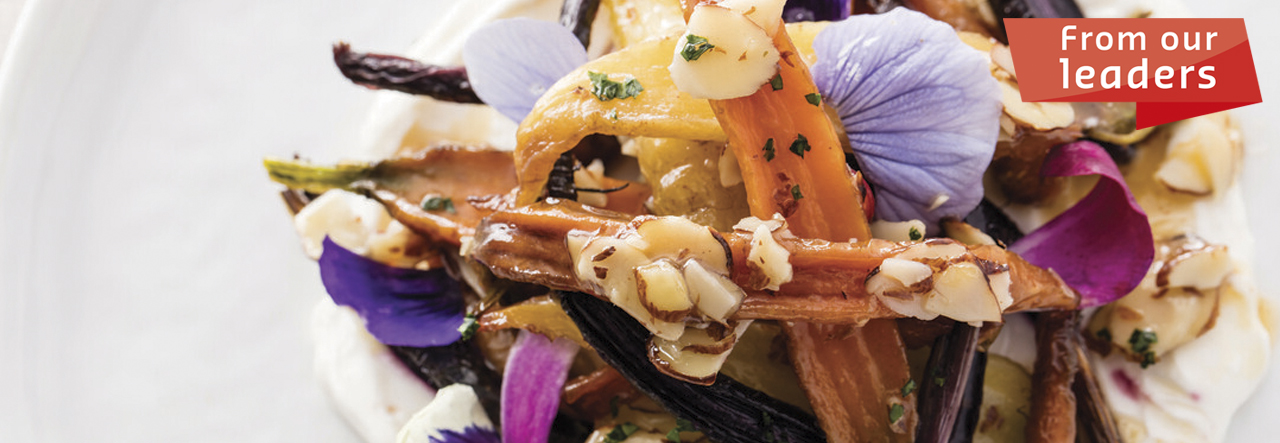World Environment Day earlier this month got me thinking about the role food can play in the fight against climate change.
Food accounts for just over a quarter of all greenhouse gas emissions, and 8-10% of emissions are due to food waste alone. It’s clear that widespread dietary choices could help mitigate the threat of climate change, and large food services organizations must be at the forefront of mitigation efforts.
Here are some of the ways we are taking action at Sodexo:
Leading the way with plant-based menus
Half of the worlds habitable land is used for agriculture. Livestock accounts for 77% of the land used for farming globally and livestock farming releases significant amounts of a powerful greenhouse gas.
To reduce the impact of the food we serve, we have been adding plant-based alternatives to our menus for more than 10 years and are aiming for 30% of our menu items globally to be plant-based by 2025. Initiatives such as Future 50 foods have been introduced across locations around the world to work towards this target. We continue to build on this by introducing new recipes whilst increasing the number of plant-based options on our menus.
Adopting a zero-waste mentality
In our kitchens we are also making a big difference through our approach to food waste, with a particular focus on waste avoidance. We have committed to reduce our food waste by 50% by 2030. We work with our chefs around the world to improve forecasting of ingredient usage, expand our guidance around waste avoidance and design recipes that incorporate the whole ingredient. We keep track of our progress with intelligent waste-measurement technology like WasteWatch and are able to better plan our dish production with technology like SmartTrack which tracks customer demand and consumption as well as supply trends in real time. This allows our teams to manage the production of meals to meet actual demand, while ensuring quality and reducing waste.
Influencing change in food choices
By offering more plant-based dishes on our menus we not only lower our contribution to greenhouse gas emissions as a company but also contribute to the larger step change of changing eating habits around the world. Part of our job is to engage consumers around more responsible food choices that positively impact the global food system. We strive to make it easier to access plant-based dishes, and at the same time generate more awareness around the impact our food decisions have on the environment.
We don’t just offer plant-based dishes but also actively encourage our consumers to enjoy these dishes which they may be unfamiliar with. For example, we’ve researched the factors that make a plant-based dish appealing to our consumers, such as the naming of dishes and regularly promote the benefits of plant-based dishes to our consumers.
Through our research on food waste behaviours we know that increasing awareness about portion control and sharing tips on meals that help reduce waste in the home kitchens can have a positive impact. Through campaigns on our client sites we are able to raise awareness about the small actions which can be taken both in our restaurants and at home to prevent food waste, ensuring that the prevention of food waste doesn’t stop after a meal is served.
Working with other organizations to tackle climate change
Protecting our planet is a collective activity, not something that any one person or organization can take on alone. We proudly work together with a range of organizations and NGOs as well as our suppliers and consumers to make a difference and go further whenever we can. For example in the UK we’ve partnered with Waste Knot and Ferry Fast, a co-operative of farmers in Worcestershire, England, to launch the Wasteful to Tasteful program. This initiative involves the purchase of boxes of ‘wonky’ fruit and veg, normally deemed too imperfect to be sold, which our chefs then transform into delicious meals.
How large food services organizations can fight global warming
I strongly believe that if we can restore the value of food as a treasured resource that should be savoured and never wasted, the potential for behaviour change would be massive. Our individual and collective food choices are the true weapon in the fight against climate change, and we all have the power to make a difference.
As a company, Sodexo has committed to reducing carbon emissions by 34% by 2025. Find out more
Find out more about our ...




